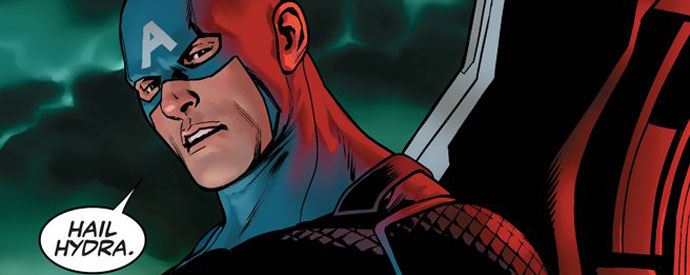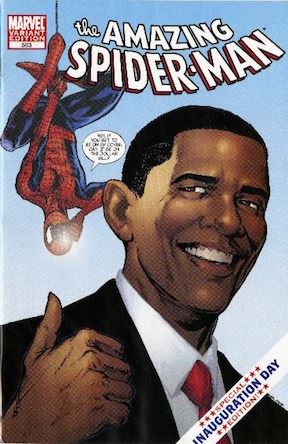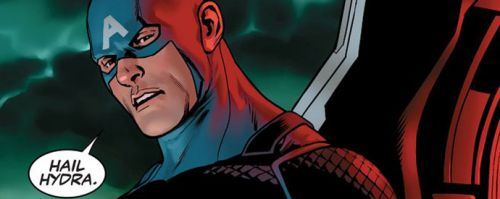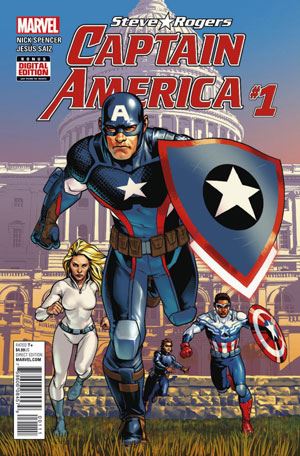Comics /
Comic Reviews /
Marvel Comics
Steve Rogers: Captain America #1

By Arch Snite
May 30, 2016 - 14:16
How can something so labored seem like it took so little work?
More spoilers ahead than a high school parking lot.
Since everyone’s talking about the big reveal in this issue, I’ll lead off with that: Cap is a Hydra agent. The twist, though, probably has to do with the “sentient Cosmic Cube named Kobik” Cap met in the preceding story arc.
Steve Rogers: Captain America #1 establishes a timeline in which an agent of Hydra got to Steve Rogers first, befriending him as a child. Thus, Steve Rogers has been with Hyrdra since before he became Captain America. Given that the Cosmic Cube can change time, it seems pretty likely that the whole Steve-as-Hydra thing is just another gimmick with a limited shelf life. Or it might be something more. Either way, once you’re past
Captain America #1’s hype and reveal, this issue falls flat.
Captain America #1 is the current it-thing in comics. If a single issue of a comic book was on Bing’s little home page news bar thingy, that means that it’s big. And that I’m one of the 4% of people who use Bing. Sadly, though, this issue is mediocre. It’s reminiscent of any number of Cap-beats-people-up stories, which, admittedly, are fun. But there are far better examples—
Ultimate Captain America #1, for instance, which follows an eerily similar pattern, but has better writing (and art— no offense to Jesus Saiz; Carlos Pacheco’s hard to beat). Writer Nick Spencer distinguishes himself not by dialogue or plotting, but by a transparent gimmick. None of this means that
Captain America #1 is without value, though.
 |
| This was a thing. Unlike Barack Obama's achievements. |
Captain America #1 is actually a useful cultural artifact. It demonstrates just how much entertainment, comics especially, has become the leg-raised, peed-on territory of the left. This is nothing new, especially for sequential art. Think back to eight years ago when Spider-Man played second fiddle to Barack Obama on the cover of an issue so ham-handed it made Cap’s famous shilling for Hostess Fruit Pies seem subtle. Or, for that matter, check Ed Brubaker’s garden variety Patriot Act complaints when he killed Cap in 2007. I could also mention the post-9/11 Cap arc written by Warren Ellis in the old Marvel Knights label, where Cap spends as much time hand-wringing as punching (the A is for apology!), but that would be a bit much. No, Nick Spencer’s story isn’t worth much as fiction, but it does gesture inadvertently towards a few things about American entertainment in 2016. With that, I give you...
THREE REVELATIONS FROM NICK SPENCER'S
CAPTAIN AMERICA THAT ARE ACTUALLY WORTHWHILE
First, America’s < 1% of creative types, even in comics, are not just liberal, but radicalized beyond relevance. Nick Spencer’s story wallows in politics to the exclusion of storytelling. The most noticeable thing about this issue isn’t its story or characters, but the jabs and insults that make it feel like a butthurt response in a youtube comments section. There are offhand digs and allusions to everything from Donald Trump to Ayn Rand to George W. Bush. There aren’t, however, lines or scenes that make Cap sympathetic. If you spend more time on political insults than storytelling, you’re insulting your readers.
 |
| NOPE NOPE NOPE NOPE NOPE NOPE |
Second, those same liberal creatives have two speeds: hate and pity. Hate is reserved for those who buck the status quo, like Milo Yiannopoulos or Donald Trump. Don’t get me wrong, Trump’s personality invites hatred. But I suspect the creative classes hate him less for his personality than for his vocal rejection of lefty dogma, i.e., political correctness. Pity, the second speed, is for those who don’t fully understand P.C. dogma, like Trump supporters, or Hydra agents, who happen to be Trump supporters in Spencer’s world. The Hydra suicide bomber Cap tries to stop in this issue gets three pages of background exposition, one of which shows him attending a Red Skull rally whose rhetoric sounds like Trump’s, if Trump’s speeches were written by a Buzzfeed intern. Sharon Carter gets some post-mortem lines pitying the young man’s predicament, and how it’s the result of an uncaring society, a bad economy, etc., but these only further gesture towards an uncomfortable reality of current entertainment: it has no desire to see the rationale behind its opponents’ ideas. Creating a pitiable character is the lazy writer’s way around actually understanding a villain’s motivations. At least Frank Baum’s straw man
wanted a heart.
Third, consumers need to continue looking outside traditional sources for their entertainment. When I went to my comic store to pick up
Captain America #1, I was pleased to see how many third party, indie publishers there seemed to be. Back when I grew up in the Age of Slap Bracelets, the presence of a serious contender like Image Comics was big news. I don’t know what market share current outsider publishers take, but their presence alone is heartening.
As a litmus test of popular entertainment, Captain America #1 is worth five dollars. As popular entertainment itself, however, you’ll find your money better spent elsewhere.
Last Updated: January 17, 2025 - 08:20



